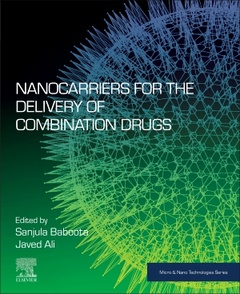Description
Nanocarriers for the Delivery of Combination Drugs
Micro and Nano Technologies Series
Coordinators: Baboota Sanjula, Ali Javed
Language: English
Subject for Nanocarriers for the Delivery of Combination Drugs:
Keywords
505 (b) (2) applications; Active targeting; Antibacterial action; Antibiotic resistance; Antimicrobial; Biomaterials; Cancer; Carbon nanotubes; Carbon; Clinical studies; CNS delivery; Codelivery; Cold atmospheric plasma; Combination drugs; Combination therapy; Combinational drug therapy; Combinational drugs; Combinational therapy; Critical quality attributes; Dendrimer; Diagnostics; Drug delivery system; Drug delivery; Drug resistance; Fixed-dose combinations; Gold nanoparticles; Graphene; Hybrid application; Infectious disease; Infectious diseases; Inorganic nanoparticles; Iron oxide nanoparticles; Lipid based drug delivery system; Lipid bilayer; Liposomes; Mesoporous silica nanoparticles; miRNA; Multidrug resistance; Multiple-drug carrier; Nanocarriers; Nanoemulsion; Nanoparticles; Nanostructured lipid carriers; Nanotechnology; Neurodegenerative disorders; Nonclinical studies; Personalized medicine; Phytotherapeutics; Plasma devices; Polymeric micelles; Reactive oxygen and nitrogen species; Risk assessment; Self- nanoemulsifying drug delivery system (SNEDDS)Solid lipid nanoparticles; siRNA; Skin; Synergistic drugs effects; Synergy; Theranostic nanocarriers; Therapeutic agents; Therapeutic efficacy; Tissue regeneration; Tuberculosis; Wound healing
540 p. · 19x23.3 cm · Paperback
Description
/li>Contents
/li>Biography
/li>Comment
/li>
Nanocarriers for the Delivery of Combination Drugs focuses on the role of nanocarriers in the delivery of combination drugs for the management and treatment of various diseases. Nanocarriers belonging to the category of polymeric nanoparticles, dendrimers, lipidic nanocarriers (like nanoemulsions), liposomes, solid lipid nanoparticles, nanostructured lipid carriers are now being used in the drug delivery of combination drugs. This book helps readers assimilate all the information available surrounding the application of various nanocarrier technologies for the delivery of combination drugs of synthetic and natural origin, including small and large molecules.
This is an important reference source for pharmaceutical scientists and biomaterials scientists who are looking to gain an increased understanding on how nanotechnology is improving the efficiency of combination drug delivery.
1. Combination drug delivery: Past, present and future 2. Application of nanocarrier approach for the delivery of combination drugs 3. Polymeric nanocarriers for delivery of combination drugs 4. Liposomal nanocarriers for delivery of combination drugs 5. Lipidic nanocariers for delivery of combination drugs 6. Nanocarriers as an effective drug delivery approach for combination drugs for treatment of cancer 7. Nanocarriers as an effective drug delivery approach for combination drugs for treatment of neurodegenerative disorders 8. Nanocarriers as an effective drug delivery approach for combination drugs for treatment of various topical skin disorders 9. Nanocarrier based formulations of combination drugs with focus on Phytoconstituents 10. Nanocarriers in delivery of combination drugs: Challenges and future aspects
Prof. Sanjula teaches at undergraduate, post graduate and doctoral levels and has also prepared e-content for postgraduate students on subjects like biopharmaceutics and cosmetics. Her research interests include improving oral bioavailability of BCS class II and Class IV drugs using approaches like complexation, polymeric conjugates, lipid based systems like microemulsions, nanoemulsions, solid lipid nanoparticles and nanostructured lipid carriers. She is actively involved in formulating nanoparticulate drug delivery systems for treatment of neurological disorders and cancer. Recently the research group of Prof. Baboota has expanded their research on formulating nanocarriers of combination drugs as combination drug therapy provides additive or synergistic effect, increases the spectrum of treatment, reduces the side effects, helps in overcoming the resistance, improves patient compliance and targets multiple pathways taking part in disease progression. Encapsulation of combination drugs in nanocarriers helps in overcoming the various biopharmaceutical challenges associated with the them thereby creating opportunities for better treatment.
Prof Baboota is actively engaged in supervising post graduate and doctoral research work. More than 65 theses at post graduate level and 30 doctoral research work is being guided by her. Her research work has received financial supports from all the leading sponsoring bodies in India. She has published more
- Outlines how nanocarriers are used to enhance combination drug delivery systems
- Assesses the major challenges of delivering combination drugs successfully, and explains how nanocarriers can help meet these challenges
- Explores the characteristics of a variety of nanocarrier material types




